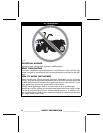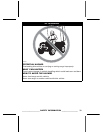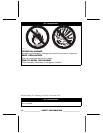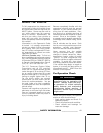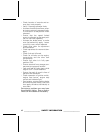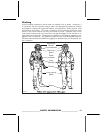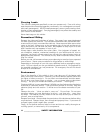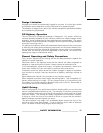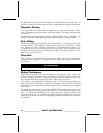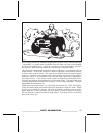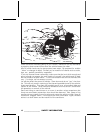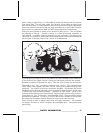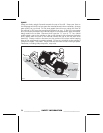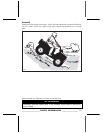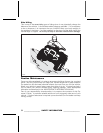
It is also wise to know the terrain condition on the other side of the hill or bank. All
too often there exists a sharp drop-off that is impossible to negotiate or descend.
Downhill Driving
This vehicle can climb slopes that are steeper than it can safely descend. There-
fore, it is essential to assure that a safe route exists to descend a slope before
you climb it.
Decelerating while negotiating a slippery downhill slope could “toboggan“ the
vehicle. Maintain steady speed and/or accelerate slightly to regain control.
Side Hilling
Whenever possible, such operation should be avoided. If necessary, do so with
extreme caution. Side hilling on steep inclines could result in rollover. In addi-
tion, slippery or unfirm surfaces could result in uncontrollable side sliding. Do
not attempt to turn the vehicle downhill with the slide. Avoid all objects or de-
pressions that will intensify the raising of one side of the vehicle higher than the
other, thus causing rollover.
Drop-Offs
This vehicle will “bottom-out“ and usually stop if either the front or rear wheels
are driven over a drop-off. If the drop is sharp or deep, the vehicle will nose dive
and tipover.
ƽ
WARNING
Avoid negotiating drop-offs. Reverse and select an alternate route.
Riding Techniques
Riding your vehicle too fast for the conditions may result in injury. Apply only
enough throttle to proceed safely. Statistics show that high speed turns usually
result in mishaps and injury. Always remember that this vehicle is heavy! Its
pure weight alone may entrap you should it fall and pin you down.
This vehicle is not designed for jumping nor can it, or you, absorb the energy of
high impacts such as jumping. Performing “wheelies“ can cause the vehicle to
flip over onto you. Both practices have a high risk for you and should be avoided
at all times.
To maintain proper control it is strongly advised that you keep your hands on the
handlebar and within easy reach of all controls. The same holds true for your
feet. To minimize the possibility of any leg or foot injury, ke
ep your feet on the
footrests at all times. Do not direct your toes outwards nor place your foot out to
assist turning as they can be hit or snagged by passing obstacles or may contact
the wheels.
46
___________
SAFETY INFORMATION
___________



